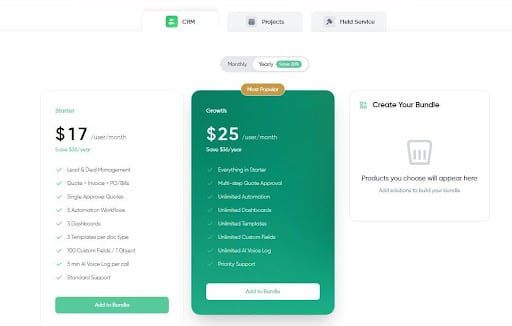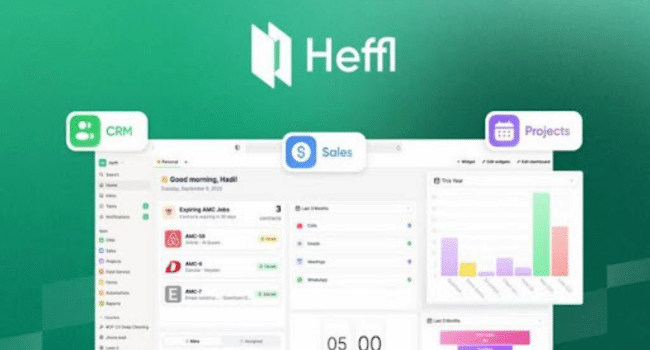Table of Contents
Heffl brings together CRM, field service management, and project operations under one roof. Small to medium enterprises get a complete business management solution without juggling multiple tools. The platform eliminates the headache of switching between different software applications.
As I said, most businesses struggle with disconnected systems that create data silos. Heffl solves this problem by centralizing your entire business workflow. You can automate quotes, manage teams, track projects, and handle payments from a single dashboard. The thing is, Heffl makes complex business operations surprisingly simple for growing teams.
Heffl Pros and Cons:
Pros:
- All-in-one platform lowers costs
- Easy UI, minimal training
- Mobile access for field work
- Automation saves time
- Integrated reports for insights
Cons:
- Fewer advanced features than specialized enterprise tools
Heffl pricing Plan:

10 Key Features of Heffl:
1. Task Management System
Heffl’s task management goes beyond basic to-do lists. You get advanced project tracking with deadline management and team collaboration features. Tasks connect directly to customer records and project timelines.
The system automatically assigns priorities based on customer importance and project deadlines. Team members receive instant notifications about task updates and changes. You can create recurring tasks for regular business activities like monthly reports or weekly check-ins.
Speaking of which, the visual dashboard shows task progress in real-time. Managers can spot bottlenecks before they become problems. The drag-and-drop interface makes task reorganization effortless. Custom fields let you add specific information relevant to your business processes.
Integration with other Heffl modules means tasks automatically update when project status changes. This prevents duplicate work and keeps everyone synchronized across departments.
02. Comprehensive CRM Solution
The CRM module handles everything from lead capture to customer retention. You get detailed contact management with communication history and interaction tracking. Custom fields store industry-specific customer information.
Pipeline management shows exactly where each prospect stands in your sales process. Automated follow-up reminders ensure no potential customer falls through the cracks. The system tracks email opens, clicks, and responses to measure engagement levels.
To be honest, most CRM systems feel overwhelming. Heffl keeps things simple while providing powerful functionality. You can segment customers based on purchase history, location, or custom criteria. Bulk email campaigns reach specific customer groups with personalized messages.
Customer service tickets integrate seamlessly with contact records. Support teams see complete customer history before responding to inquiries. This context improves response quality and customer satisfaction. Mobile access means your CRM data travels wherever business takes you.
03. Advanced Sales Management
Sales teams get complete control over the entire sales cycle. Quote generation happens automatically using predefined templates and pricing rules. Proposals include professional formatting with your company branding.
The sales pipeline provides visual representation of deal progress. You can forecast revenue based on current opportunities and historical conversion rates. Commission calculations happen automatically when deals close.
Let me think about what makes this special. Sales managers can set individual or team targets with progress tracking. The system identifies which products sell best and which sales methods work most effectively. Custom reports show sales performance across different time periods.
Integration with inventory management prevents overselling products. Payment tracking connects to accounting systems for accurate financial records. Sales analytics help identify trends and opportunities for business growth.
04. Purchase Management System
Purchase management streamlines vendor relationships and procurement processes. You can create purchase orders directly from inventory alerts or project requirements. Vendor databases store contact information, payment terms, and performance history.
The system tracks purchase order status from creation to delivery. Automatic alerts notify teams when shipments are overdue or when invoices need payment. Budget controls prevent unauthorized purchases above specified limits.
Another way to look at it: purchase management connects to project budgets and inventory levels. This integration ensures you order the right quantities at the right time. Vendor comparison tools help negotiate better prices and terms.
Approval workflows route purchase requests through appropriate management levels. This maintains spending control while enabling quick decisions for urgent needs. Electronic signatures speed up the approval process for remote teams.
05. Project Management
Project management combines task scheduling, resource allocation, and budget tracking. Gantt charts visualize project timelines with dependency relationships. Team members see exactly what needs completion and when.
Resource management prevents team overallocation across multiple projects. Time tracking captures actual work hours against estimated project timelines. Budget monitoring alerts managers when projects approach spending limits.
By the way, project templates speed up setup for similar work. You can duplicate successful project structures for new clients or recurring work. Milestone tracking ensures important deadlines receive proper attention.
Client portals provide project visibility without exposing internal operations. Customers can review progress, approve deliverables, and communicate with project teams. This transparency builds trust and reduces status update meetings.
06. File Management System
Centralized file storage eliminates the chaos of scattered documents across different platforms. Version control ensures teams always work with the most current file versions. Automatic backups protect against data loss.
Permission controls restrict file access based on user roles and project involvement. You can share files with clients through secure links with expiration dates. File organization follows project and customer structures for easy retrieval.
The way I see it, document collaboration becomes much smoother when everyone accesses the same system. Comments and annotations keep feedback organized and actionable. Search functionality finds files quickly using names, tags, or content.
Integration with other modules means files automatically attach to relevant records. Project documents connect to tasks, while customer files link to CRM records. Mobile access lets field teams view drawings, specifications, and other critical documents.
07. Forms Builder Tool
Custom forms collect exactly the information your business needs. Drag-and-drop form building requires no technical skills. Forms can include text fields, checkboxes, dropdown menus, and file uploads.
Conditional logic shows or hides form sections based on user responses. This creates personalized experiences while keeping forms concise. Automatic form routing sends submissions to appropriate team members.
Just between you and me, most form builders create forms that look generic. Heffl’s forms match your brand colors, fonts, and styling. Mobile-responsive design ensures forms work perfectly on any device.
Form data integrates directly into CRM records, project files, or task assignments. This eliminates manual data entry and reduces errors. Analytics show which forms generate the most responses and where users typically abandon the process.
08. Automation Engine
Business process automation eliminates repetitive tasks and reduces human error. You can create automation rules without coding knowledge. Triggers activate based on specific conditions or time intervals.
Email automation sends personalized messages based on customer behavior or project milestones. Task automation creates follow-up activities when certain conditions are met. Data automation updates records across different modules simultaneously.
Come to think of it, automation saves incredible amounts of time once properly configured. The system can automatically assign leads to sales representatives based on territory or specialization. Invoice generation happens automatically when project milestones are completed.
Workflow automation routes approvals through proper channels based on dollar amounts or request types. This maintains compliance while speeding up business processes. Custom automation rules adapt to your specific business requirements.
09. Inbox Management
Unified inbox management consolidates communications from multiple channels. Email, internal messages, and customer inquiries appear in one organized interface. Priority sorting ensures urgent messages receive immediate attention.
Message categorization routes communications to appropriate team members automatically. Shared inboxes enable team collaboration on customer service requests. Response templates ensure consistent communication quality.
That reminds me of how scattered communication can damage customer relationships. Heffl prevents messages from getting lost between team members. Conversation history connects to customer records for complete context.
Automated responses acknowledge receipt of customer inquiries and set expectations for response times. Integration with CRM modules creates support tickets for complex issues requiring detailed resolution.
10. Reports & Analytics
Comprehensive reporting provides insights across all business operations. Pre-built reports cover sales performance, project profitability, customer satisfaction, and team productivity. Custom reports focus on metrics specific to your industry.
Real-time dashboards display key performance indicators without requiring report generation. Visual charts and graphs make data easy to understand and act upon. Scheduled report delivery keeps stakeholders informed automatically.
All things considered, data-driven decisions improve business outcomes significantly. Heffl analytics identify trends, opportunities, and potential problems before they impact operations. Comparative reporting shows performance changes over different time periods.
Export functionality allows data analysis in external tools like Excel or Google Sheets. API access enables integration with specialized analytics platforms for advanced business intelligence needs.
Heffl works best for service-based businesses managing multiple client projects simultaneously. Construction companies use it for project scheduling, client communication, and field service coordination. Marketing agencies benefit from client relationship management and project timeline tracking. Consulting firms leverage the CRM for lead nurturing and project delivery management. Field service businesses use mobile access for on-site work order management and customer updates.
